TEST BENCH AND PROTOCOL
Our testing focus here today is on the data transfer speeds of the DT01ACA300. To see the best storage system performance possible the CPU C states have been disabled, C1E support has been disabled, Enhanced Intel SpeedStep Technology (EIST) has been disabled. Benchmarks for consumer testing are also benchmarks with a fresh drive so that not only can we verify that manufacturer specifications are in line, but also so the consumer can replicate our tests to confirm that they have a drive that is in top-notch condition. We even provide links to most of the benchmarks used in the report.
SYSTEM COMPONENTS
This Test Bench build was the result of some great relationships and purchase; our appreciation goes to those who jumped in specifically to help the cause. Key contributors to this build are our friends at ASRock for the motherboard and CPU. Also, a big thank you to Thermaltake for the case. We have detailed all components in the table below should you wish to make a duplicate of our system as so many seem to do, or check out the price of any single component. As always, we appreciate your support in any purchase through our Amazon links.
BENCHMARK SOFTWARE
The software we will be using for today’s analysis is typical of many of our reviews and consists of Crystal Disk Info, ATTO Disk Benchmark, Crystal Disk Mark, Anvil’s Storage Utilities, HDTune PRO, PCMark8 and PCMark Vantage. We prefer to test with easily accessible software that the consumer can obtain, and in many cases, we even provide links (just click on the software title in the heading for that section). Our selection of software allows each to build on the last and to provide validation to results already obtained.
Crystal Disk Info is a great tool for displaying the characteristics and health of storage devices. It displays everything from temperatures, to the number of hours the device has been powered, and even to the extent of informing you of the firmware version of the device.
Crystal Disk Info shows us that this HDD has only been powered on twice, for a total of one hour. We also see that S.M.A.R.T. drive health and performance monitoring attributes, as well as advanced power management (APM) and native command queuing (NCQ) are enabled. We also see right under the drive’s model number is the firmware version, and we see that the drive is in good health.
ATTO DISK BENCHMARK VER. 2.4.7
ATTO Disk Benchmark is perhaps one of the oldest benchmarks going and is definitely the main staple for manufacturer performance specifications. ATTO uses RAW or compressible data and, for our benchmarks, we use a set length of 256MB and test both the read and write performance of various transfer sizes ranging from 0.5 to 8192KB. Manufacturers prefer this method of testing as it deals with raw (compressible) data rather than random (includes incompressible data) which, although more realistic, results in lower performance results.
In our ATTO sequential testing, the DT01ACA300 was able to attain maximum sequential write speeds of 196.3MB/s, and maximum sequential read speeds of 194.5MB/s. For all transfer sizes of 16KB and larger, both sequential read and write speeds were above 191.7MB/s. This drive is demonstrating its consistency with these results.
CRYSTAL DISK BENCHMARK VER. 3.0 X64
Crystal Disk Benchmark is used to measure read and write performance through sampling of random data which is, for the most part, incompressible. Crystal Disk Mark can test with either “zero fill” (compressible) data, or with random (incompressible) data. Performance is virtually identical, regardless of data sample, so we have included only results using random data. Random data is more typical of consumer use.
Crystal Disk Mark random data testing shows the DT01ACA300 HDD attaining maximum sequential reads of 199.1MB/s, and maximum sequential writes of 196.3MB/s. As is typical of 7200 rpm spinning platter HDDs, random 4K reads and writes were both less than 1MB/s at 0.75MB/s and 0.72MB/s, respectively.
ANVIL STORAGE UTILITIES PROFESSIONAL
Anvil’s Storage Utilities (ASU) is the most complete test bed available for storage drives today. The benchmark displays test results for not only throughput, but also IOPS and Disk Access Times. Not only does it have a preset benchmark, but also has included such things as endurance testing and threaded I/O read, write and mixed tests; all of which are very simple to understand and use in our benchmark testing.
Anvil Storage Utilities testing is a bit more rigorous than most of our other benchmarking software, and we rather expect to see results that reflect that. Under Anvil’s workloads, sequential reads topped out at 187.0MB/s, and sequential writes topped out at 148.2MB/s. Random 4K reads were similar to our CDM results at 0.73MB/s, but the random 4K writes more than doubled to 1.66MB/s. The total Anvil score of 390.38 is about 20% higher than any other 3TB HDDs that we have tested.
HD Tune is a Hard Disk Utility with many functions, including error checking, health testing (S.M.A.R.T.), drive wiping and of course benchmarking.
In our HD Tune sequential reads testing run, the DT01ACA300 attained average transfer rates of 151.9MB/s, and maximum transfer rates of 196.7MB/s. The burst test topped out at 412.3MB/s and average access time was 15.5ms.
In our HD Tune sequential writes testing, we were able to attain average transfer rates of 149.2MB/s and maximum transfer rates of 193.4MB/s Burst topped out at 208.8MB/s, and average access time was 14.4ms.
HD Tune random reads averaged 26.51MB/s, with average access times of 19.13ms. This is about average for a HDD in this testing.
The HD Tune random writes averaged 20.22MB/s, with average access times of 25.08ms. Again, this is comparable to other HDDs.
The HD Tune extra read testing gives us a little deeper dive into performance of the HDD across the entire platter area, breaking performance down into three “zones” – the “outer” area of the platter, the “middle” area of the platter, and the “inner” area of the platter. The results shown reinforce one aspect of mechanical HDDs – performance will always drop as the read/write heads have to move further to reach the center and inner tracks of the platter(s). Latency increases and performance drops as we move further away from the outer edge toward the inner tracks
In our HD Tune extra reads testing, sequential “outer” reads were 186.22MB/s, sequential “middle” reads were 158.60MB/s, and sequential “inner” reads were 83.68MB/s. The DT01ACA300 attained a maximum burst speed of 417.90MB/s, while random 8MB seeks speeds were 90.55MB/s. These numbers are quite solid for a HDD.
HD Tune extra writes testing produced results of 180.23MB/s for sequential “outer” reads, 158.60MB/s for sequential “middle” reads, and 83.69MB/s for sequential “inner” reads. The maximum burst speed was 215.77MB/s, with random 8MB seek speeds of 53.86MB/s. These numbers are above average as compared to most HDDs.
Review Overview
Build quality
Performance
Availability
Warranty
Pricing
Excellent value!
Toshiba' DT01ACA300 HDD is less than $0.03/GB for 3TB of premium mechanical storage! This is an excellent storage add-on when capacity is needed at a very low cost!
 Technology X Tomorrow's Technology Today!
Technology X Tomorrow's Technology Today!

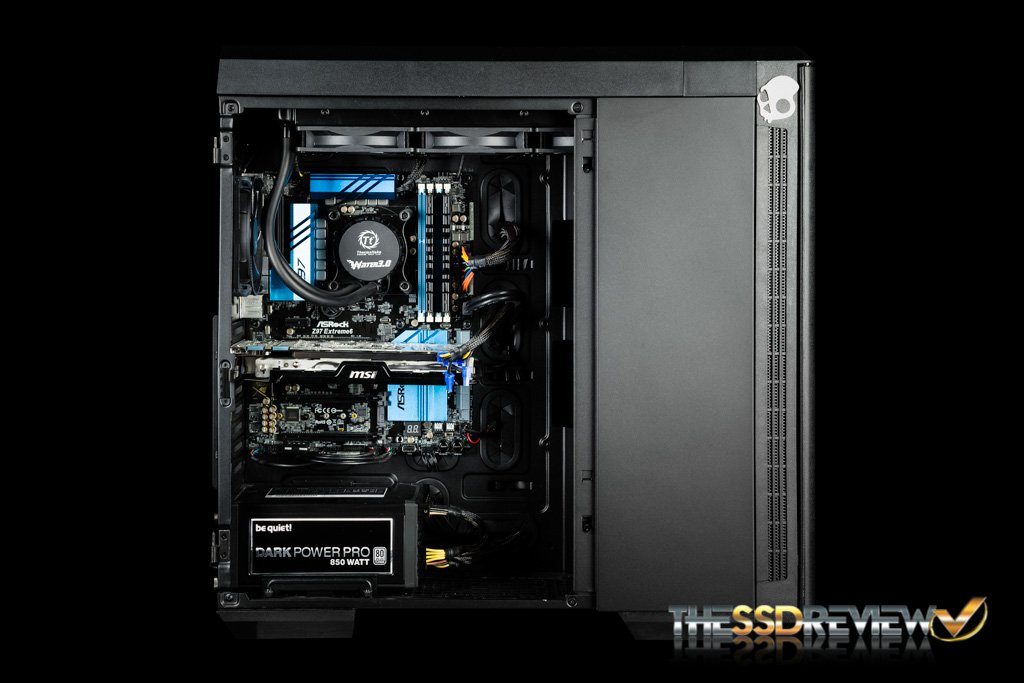
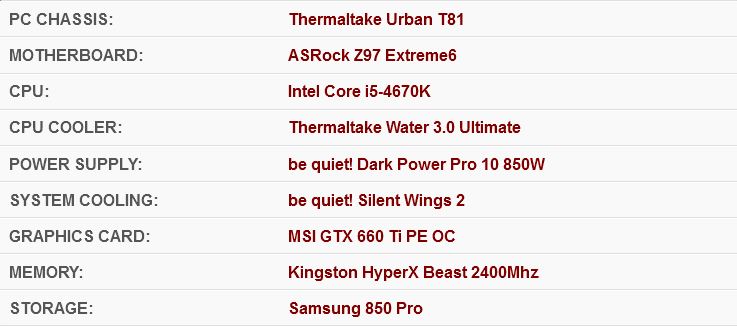
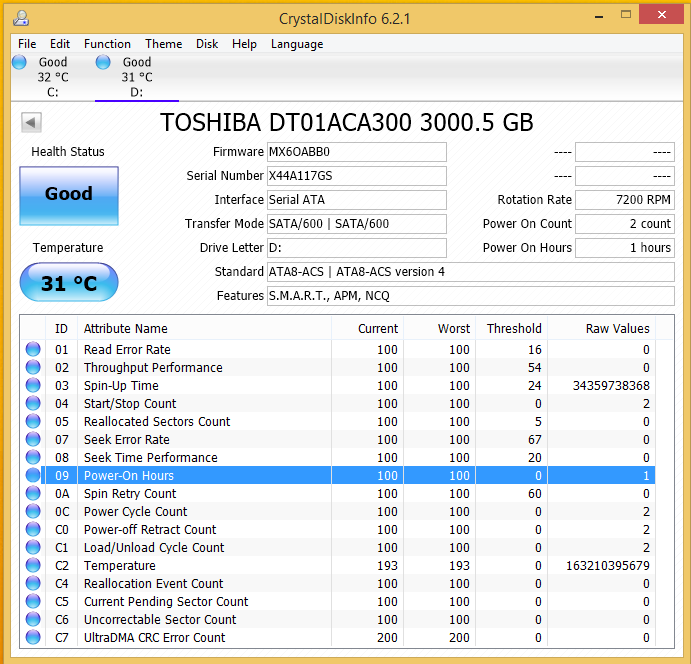
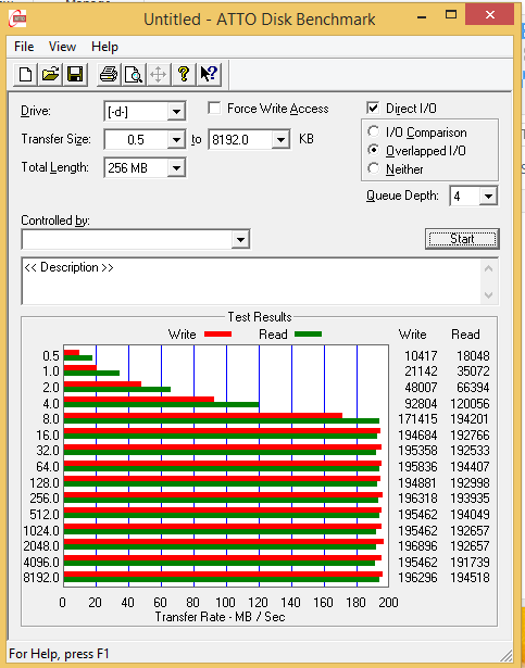
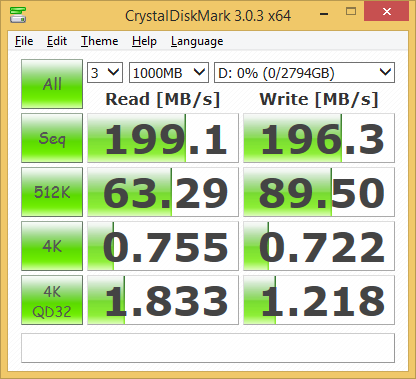
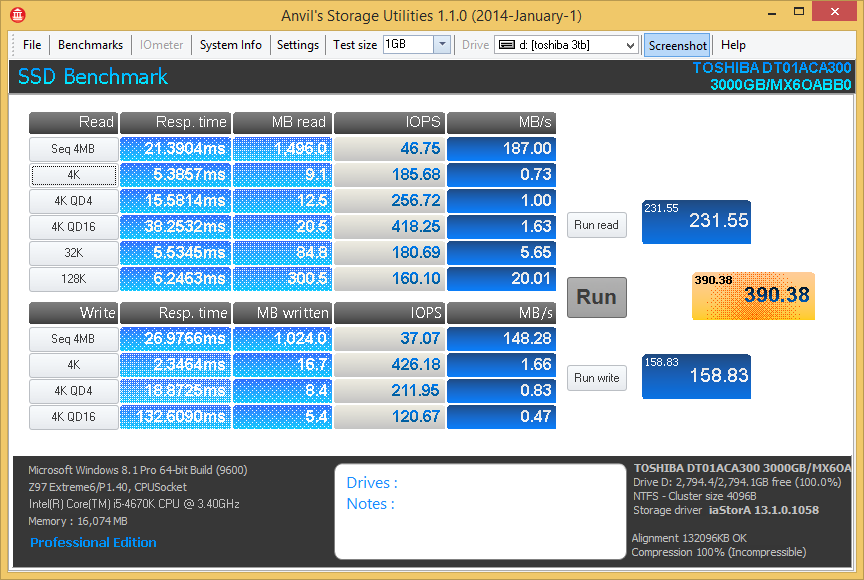
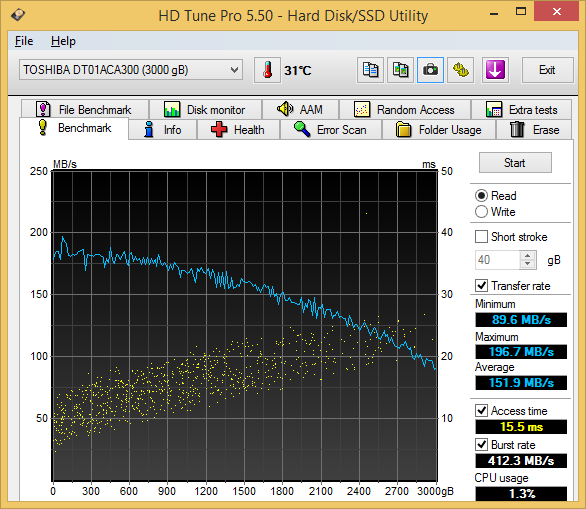
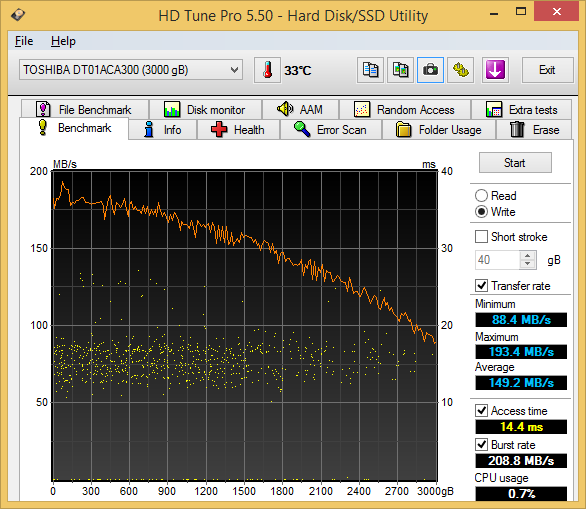
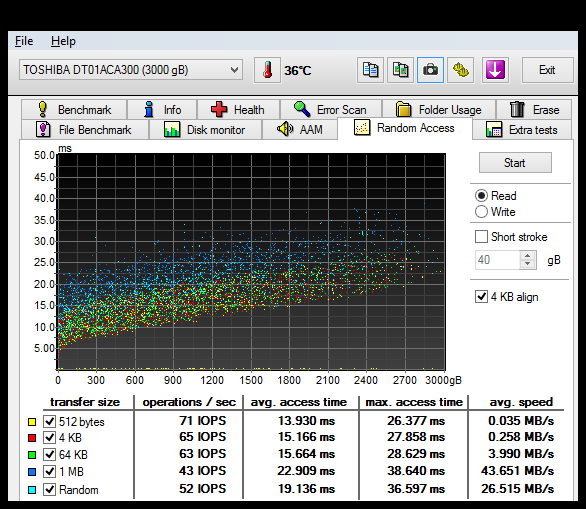
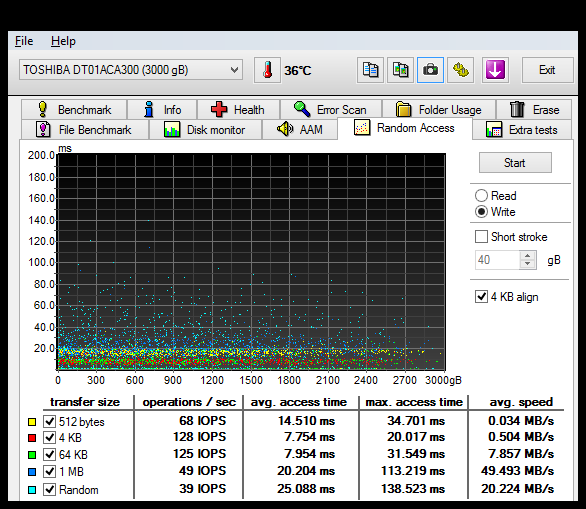
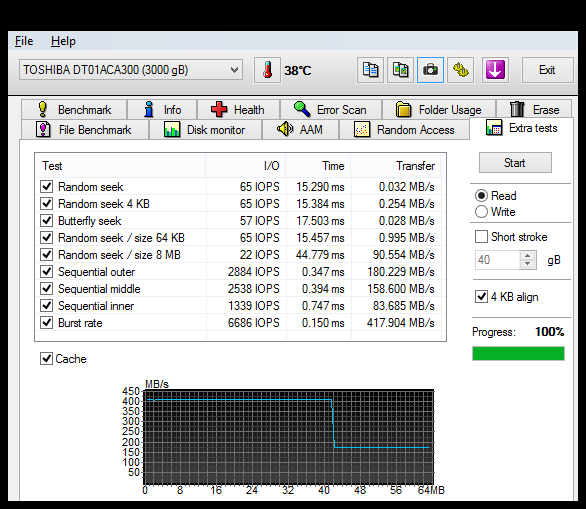
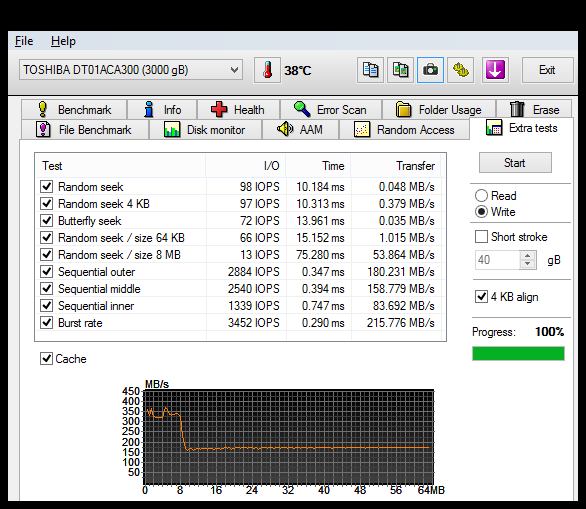
I love this drive very easy to install, they only problem is after installing the HDD you have only 2.7TB available, but that’s for most HDD & Companies they shouldn’t advertise 3,4,5TB if they are giving you less after is formatted and ready.
It’s 3TB because they’re using the accurate definition of the tera- prefix, it’s a 3 trillion byte drive.
Yep. 3*10^12 / 1024 / 1024 / 1024 / 1024 bytes = 2.728 TB. And then the filesystem takes up some, but not much.
‘accurate’ meaning completely inaccurate bastardization forced into place by hdd manufacturers years ago. It was the community that created a new word that was actually accurate since HDD manufacturers were causing an uproar with their 1000 bytes per MB nonsense instead of REALITY which is 1024 bytes per MB.
Yes, but this is like ford making a car that can run at 100mph but when you receive it it run at 100 kph (100mph = 160,2 km). And the big the hdd is most percent of it you lose. With gb you lose about 7,38% and with tb you lose 9,96%.
A lot of the missing space, if not all of it, is taken up by your file system itself. That’s the way the computer indexes and keeps track of data on the hdd and takes up some of the drive’s usable capacity.
Your drive has 3 Trillion bytes windows uses different math to calculate and divide it with 1024 instead of 1000
why the user rating only 2.9 ?
I’ve had two of these units and they both failed at separate times. In both cases, the motor failed to spin up. Diagnostics by a qualified electronic tech showed that in both cases, the circuit board’s spindle motor control circuit failed beyond the fuse and diode protected power leads. I can handle one failure, but two in the exact same fashion? I avoid Toshiba hard drives now.